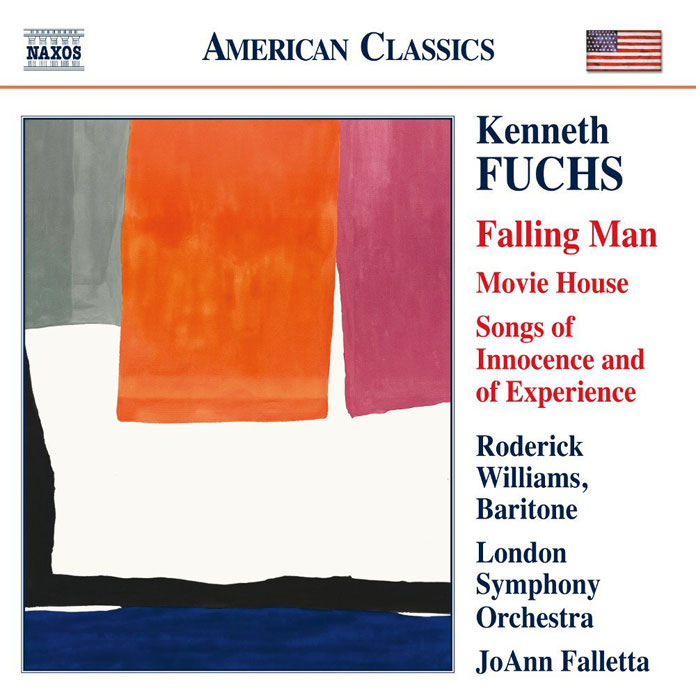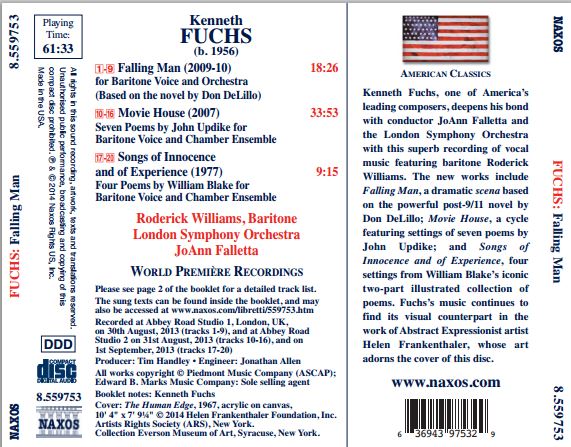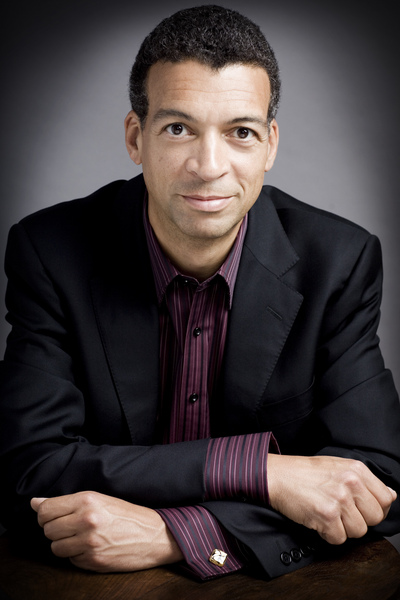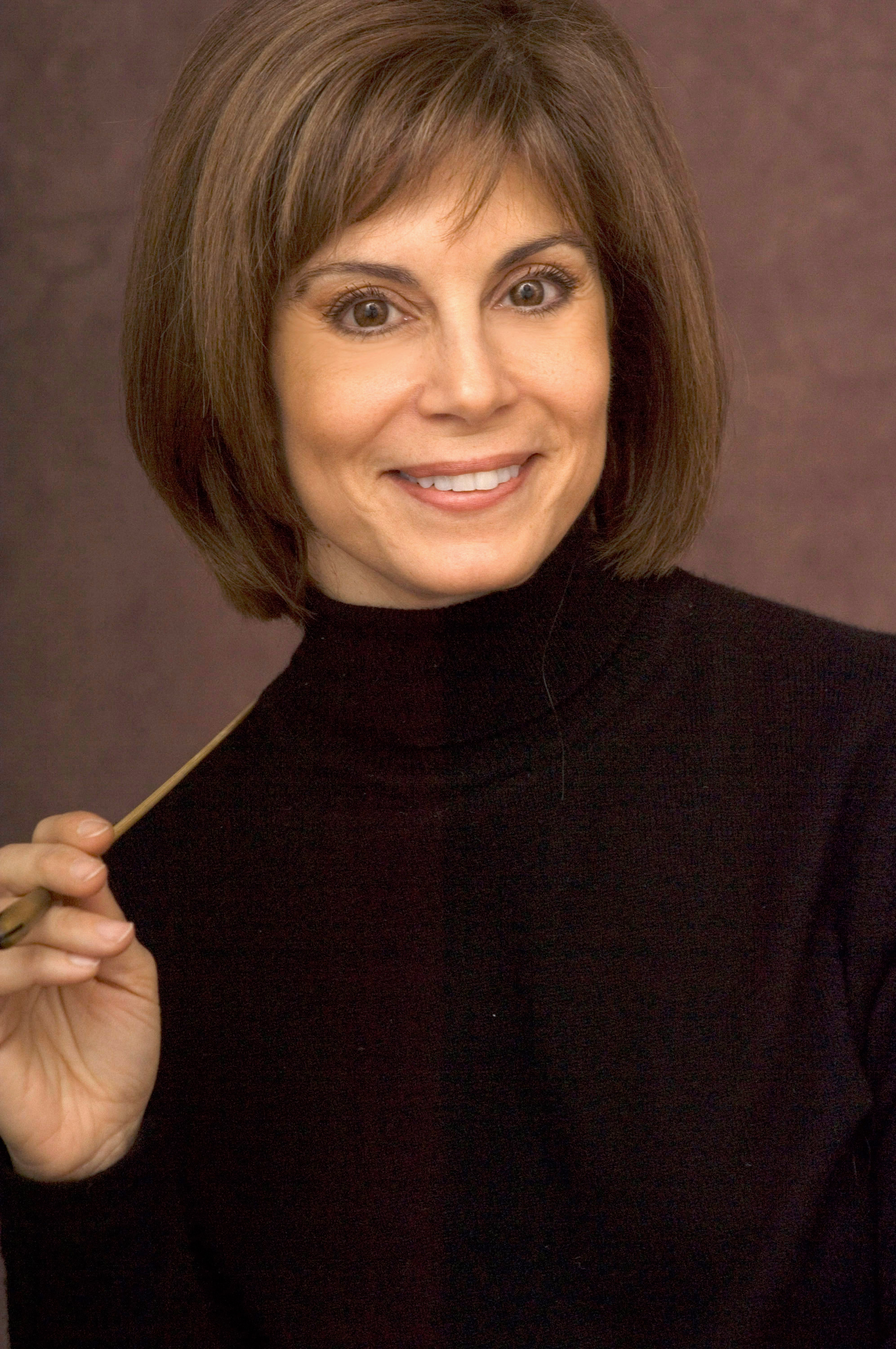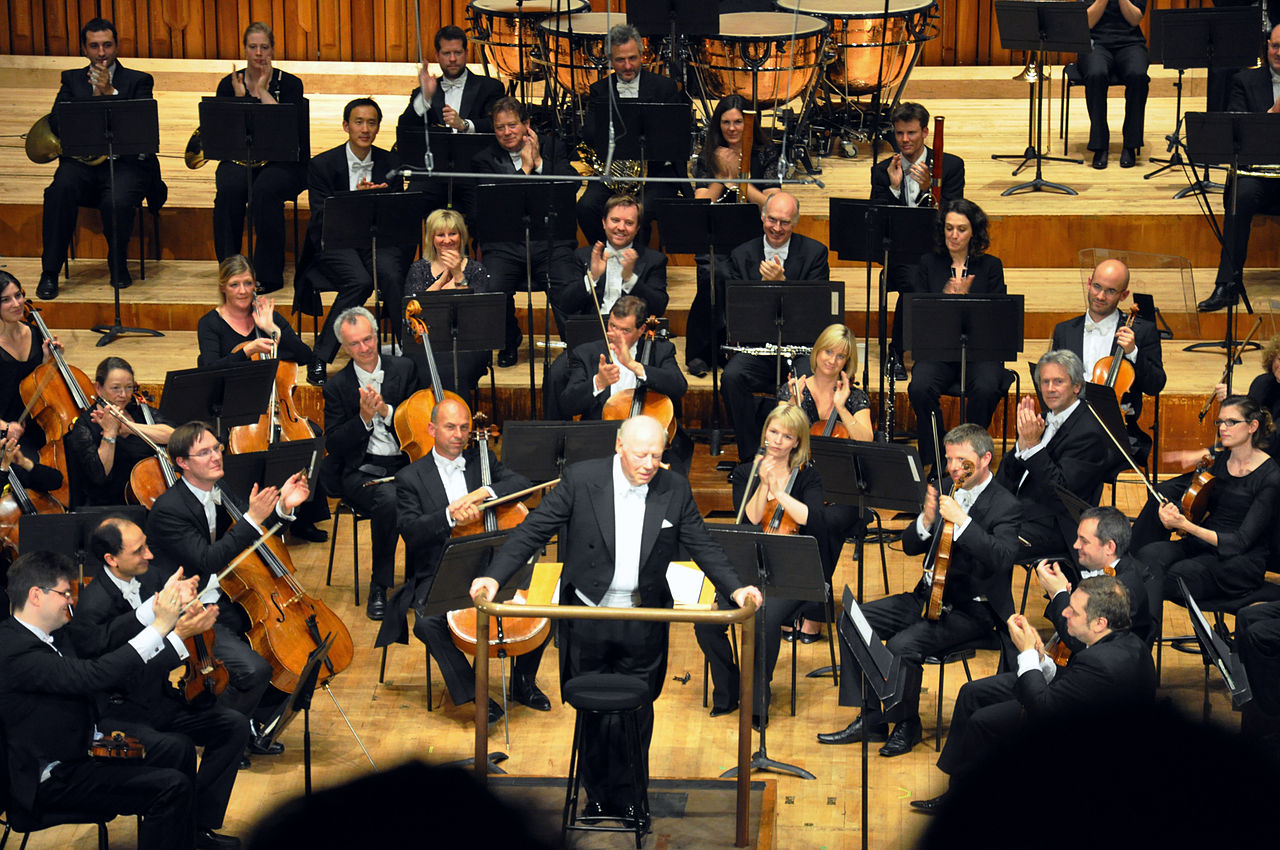Share This
Album at a Glance
Tags
Related Posts
- Music for Brass Septet, Vol. 2 - Instrumental suites from operas by Rameau, Blow, Purcell & Handel / Septura
- Franz Ignaz Beck (1734-1809): Symphonies Op. 4, Nos. 1-3, Op. 3, No. 6 / Czech CO, Pardubice
- Stephen Paulus (1949-2014): Concerto & Orchestral Works / Guerrero; Nashville
- Xavier Montsalvatge: Works for Orchestra / Marta Matheu, soprano
Kenneth Fuchs: Falling Man; Movie House; Songs of Innocence & of Experience / Roderick Williams, baritone
September 11, 2001 was a day never to be forgotten. It was unspeakably devastating, and a tragically surreal day for all who witnessed the events unfold. I was there that day, hearing incessant sirens, watching in disbelief as the North Tower crumbled, smelling the stench and wandering in all directions trying to escape the reality... Such is the subject matter with which the music on this disc intends to grapple. Based on Don DeLlllo’s post-9/11 novel Falling Man, the eponymous song cycle composed by Kenneth Fuchs is a stunning work that truly encapsulates the ineffable experiences of that day. Fuchs' music supports but never overshadows baritone Roderick Williams. You can hear every gripping word of the sung narrative. The London Symphony’s superb accompaniment is under the excellent direction of JoAnn Falletta. With Falling Man, Fuchs has written what for me is the defining musical memorial of 9/11. The music has the grace and strength needed for such a work.
There are two other song cycles filling out this wonderful disc. One is based on the poems of John Updike and the other one on poetry of William Blake. Fuchs is one of the great composers of our time, composing music that is expressive, beautiful and broadly tonal. The Updike piece, 2007's Movie House, is based on the writer's second volume of poetry. Again, the songs are set for baritone, this time supported by a chamber ensemble. The poems are brilliantly set. They evoke a different time and feeling: the 1950’s. Williams singing in his dramatic best captures the mood and meaning of these poems.
One of his earliest works, Songs of Innocence and of Experience, was composed in 1977 while Fuchs was still in college. One can see and hear the roots of his great future music. These songs, settings of Blake texts from 1794, also employ the baritone voice with chamber ensemble. The work includes Blake’s marvelous poem 'The Tyger' which is the pinnacle piece for this interesting and sensitive set. It is a fascinating work bordering on the atonal, making frequent use of the 12 tone scale.
This disc is well worth owning for the music and the works show off the best in contemporary classical music. Williams is an outstanding baritone and we are lucky to hear him on these works. This release was recorded at Abbey Road Studios in 2013. The sound quality of the disc, as on most Naxos issues, is outstanding. I hope that Fuchs continues to compose such interesting and wonderful music in the future.
Kenneth Fuchs, one of America's leading composers, deepens his bond with conductor JoAnn Falletta and the London Symphony Orchestra with this superb recording of vocal music featuring baritone Roderick Williams. The new works include Falling Man, a dramatic scena based on the powerful post-9/11 novel by Don DeLillo; Movie House, a cycle featuring settings of seven poems by John Updike; and Songs of Innocence and of Experience, four settings from William Blake's iconic two-part illustrated collection of poems. Fuchs's music continues to find its visual counterpart in the work of Abstract Expressionist artist Helen Frankenthaler, whose art adorns the cover of this disc.
Source: Naxos
|
Kenneth Fuchs, composer Kenneth Fuchs (b. 1956) is an American composer, conductor, and educator. He is Professor of Music Composition at the University of Connecticut (Storrs). Fuchs has composed music for orchestra, band, chorus, and various chamber ensembles. With Pulitzer Prize-winning playwright Lanford Wilson, he created three chamber musicals, The Great Nebula in Orion, A Betrothal,and Brontosaurus, which were originally presented by Circle Repertory Company in New York City. His music is regularly performed in the United States, Europe, China, and Japan. The London Symphony Orchestra, under the baton of JoAnn Falletta, has recorded four discs of Fuchs’s music for Naxos American Classics. The first, released in August 2005, was nominated for two Grammy Awards. The second disc, which features music for horn, was released in January 2008. Following the release of this disc, MusicWeb-International stated, “Fuchs’s distinctive voice is evident from the outset, and his flair for orchestral colours and sheer lyricism shine through.” The third disc, recorded in August 2011 at London’s historic Abbey Road Studios, was released in August 2012. Following the release of this disc, BBC Music Magazine stated, “Kenneth Fuchs writes tonal orchestral music of great imagination. He’s a master of orchestral writing. On Naxos’s third Fuchs recording, everything gets five-star treatment. The LSO under JoAnn Falletta sounds brilliant in a spacious Abbey Road recording.” The fourth disc, recorded at Abbey Road Studios in August 2013, featuring a program of vocal music based on texts by Don DeLillo, John Updike, and William Blake, was released in August 2014. Gramophone Magazinefeatured the disc in its Awards Issue (October 2014), stating, “Fuchs claims his own expressive warmth and colour…. The performances are exemplary, from baritone Roderick Williams’s commanding artistry to the bold, fresh playing of the London Symphony Orchestra under JoAnn Falletta’s sensitive direction.” Fuchs’s latest disc of chamber music was released by Naxos in April 2013 and includes Falling Canons (Christopher O’Riley, piano), Falling Trio (Trio21), and String Quartet No. 5 “American” (Delray String Quartet). The disc received outstanding reviews in print and at on-line sources, including Fanfare Magazine, Gramophone Magazine, and MusicWeb-International. |
|
|
Roderick Williams, bass-baritone Roderick Williams (b. 1965) is an English operatic baritone. Williams was born in North London; his father was English and his mother Jamaican. He studied on the Opera Course at the Guildhall School of Music in London. During his time there he made his operatic debut as Tarquinius in Benjamin Britten’s The Rape of Lucretia. He has appeared as a soloist with English National Opera, Opera North, Scottish Opera, New Israeli Opera, BBC Proms and at The Royal Opera House, Covent Garden. He has also worked with orchestras throughout Europe, including all the BBC orchestras in the UK, and has given recitals at venues such as the Wigmore Hall. On 13 September 2014 Williams was soloist at the Last Night of the Proms for the first time. In the course of the evening, he performed in the Richard Strauss cantata, Taillefer, sang his own arrangements of two songs, and was the soloist in “Rule Britannia”. He is married with a son and two daughters.
|
|
|
JoAnn Falletta, conductor JoAnn Falletta (b. 1954) is an American classical musician and orchestral conductor. Born in New York City on February 27, 1954, she was raised in the borough of Queens in an Italian-American household. Falletta was educated at the Mannes College of Music and The Juilliard School in New York City. She began her musical career as a virtuoso guitar and mandolin player, and in her twenties was often called to perform with the Metropolitan Opera and New York Philharmonic when a work called for a mandolin or guitar obbligato. She entered Mannes in 1972 as a guitar student, but began conducting the student orchestra in her freshman year, immediately precipitating her desire for a career as a conductor. While the Mannes administration at that time expressed doubts about the ability of any woman to gain a music directorship, it consented to an official transfer of emphasis for Falletta. After graduation, she pursued further study at Queens College (M.A. in orchestral conducting) and the Juilliard School of Music (M.M., D.M.A. in orchestral conducting). Falletta studied conducting with Jorge Mester, Semyon Bychkov, and others, including master classes under Leonard Bernstein. In 1991, Falletta was appointed the eleventh music director of the Virginia Symphony Orchestra. In May 2011, she signed the most recent extension of her Virginia contract through the 2015–2016 season.[1] She has also served as music director of the Long Beach Symphony and of The Women’s Philharmonic Orchestra (San Francisco).[2] In May 1998, Falletta was named music director of the Buffalo Philharmonic Orchestra, and she formally took up the post with the 1999–2000 season. During her tenure in Buffalo, the orchestra has made recordings for Naxos and returned to Carnegie Hall after a 20-year absence. In 2004, the orchestra and television station WNED established the JoAnn Falletta International Guitar Concerto Competition. Her present contract with the organization runs through the 2015–2016 season.[3] In 2011 she was appointed artistic director of the Hawai’i Symphony Orchestra. In 2011 she was appointed the Principal Guest Conductor of the Brevard Music Institute, serving through the 2013 season. |
|
|
London Symphony Orchestra The London Symphony Orchestra (LSO), founded in 1904, is the oldest of London’s symphony orchestras. It was set up by a group of players who left Henry Wood’s Queen’s Hall Orchestra because of a new rule requiring players to give the orchestra their exclusive services. The LSO itself later introduced a similar rule for its members. From the outset the LSO was organised on co-operative lines, with all players sharing the profits at the end of each season. This practice continued for the orchestra’s first four decades. The LSO underwent periods of eclipse in the 1930s and 1950s when it was regarded as inferior in quality to new London orchestras, to which it lost players and bookings: the BBC Symphony Orchestra and the London Philharmonic in the 1930s and the Philharmonia and Royal Philharmonic after the Second World War. The profit-sharing principle was abandoned in the post-war era as a condition of receiving public subsidy for the first time. In the 1950s the orchestra debated whether to concentrate on film work at the expense of symphony concerts; many senior players left when the majority of players rejected the idea. By the 1960s the LSO had recovered its leading position, which it has retained subsequently. In 1966, to perform alongside it in choral works, the orchestra established the LSO Chorus, originally a mix of professional and amateur singers, later a wholly amateur ensemble. As a self-governing body, the orchestra selects the conductors with whom it works. At some stages in its history it has dispensed with a principal conductor and worked only with guests. Among conductors with whom it is most associated are, in its early days, Hans Richter, Sir Edward Elgar, and Sir Thomas Beecham, and in more recent decades Pierre Monteux, André Previn, Claudio Abbado, Sir Colin Davis and Valery Gergiev. Since 1982, the LSO has been based in the Barbican Centre in the City of London. Among its programmes there have been large-scale festivals celebrating composers as diverse as Berlioz, Mahler and Bernstein. The LSO claims to be the world’s most recorded orchestra; it has made gramophone recordings since 1912 and has played on more than 200 soundtrack recordings for the cinema, of which the best known include the Star Wars series. Source: http://en.wikipedia.org/wiki/London_Symphony_Orchestra |
About Jeffrey Tarlo
| Thinking about purchasing this album?
Follow this link for more album details or to make the purchase. Buy it now |
“Not just recommended. Guaranteed.”
We stand behind every album featured on Expedition Audio. Our objective is to take the monetary risk out of music exploration. If you order this album from HBDirect.com and do not like it you can return it for a refund.





